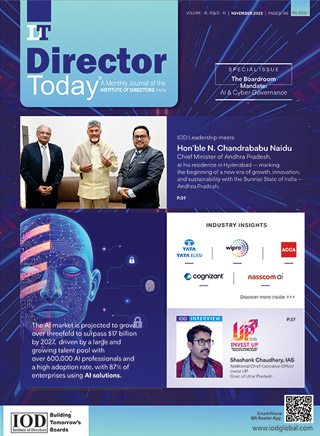Future of Corporate Governance and Evolving Boardroom Priorities

In an era marked by unprecedented transformation driven by technology, globalisation, climate change, and shifting stakeholder expectations the role of corporate governance has never been more critical. Boardrooms across the globe, and particularly in India, are undergoing a paradigm shift, redefining their priorities to stay relevant, resilient, and responsible. At the Institute of Directors, we believe that directors must not only govern with foresight but also lead with purpose.
Governance beyond Compliance
Traditionally, corporate governance was largely viewed through the lens of regulatory compliance. Today, it is evolving into a more holistic, value-driven framework. Boards are now expected to go beyond the letter of the law to uphold the spirit of transparency, accountability, and long-term sustainability. Investors, regulators, and society at large are closely scrutinising the ethical compass of companies. Integrity in decision-making is now as vital as financial performance.
Sustainability and ESG Oversight
One of the most prominent boardroom shifts has been the elevation of ESG (Environmental, Social, and Governance) responsibilities. With SEBI mandating Business Responsibility and Sustainability Reporting (BRSR) for the top 1000 listed companies, ESG has become a board-level imperative in India. Directors are now required to develop a deep understanding of climate risk, supply chain sustainability, and social impact, ensuring these onsiderations are embedded into corporate strategy and risk management.
Digitisation and Cybersecurity Risk
Digital transformation continues to disrupt traditional business models, and boardrooms must keep pace. While embracing technology enables agility and innovation, it also brings significant risks. Cybersecurity is no longer an IT issue it is a governance issue. Boards must take ownership of digital oversight, ensuring data protection, resilience against cyber threats, and ethical AI use are treated as top priorities.
Preparing Boards for 2030: A Futuristic Outlook
Emerging trends in corporate governance and building futuristic boards for 2030 include a range of complex and interconnected challenges. How do we build more tech-savvy, diverse, ethical, and inclusive boards and workplaces? How do we address cyber risks while ensuring responsible digitisation and the ethical use of AI? Boards today face mounting economic, environmental, and geopolitical challenges. Directors and CEOs must demonstrate resilience and the ability to lead in a volatile world. For instance, boards must determine the strategies necessary to truly embrace sustainability, not just for the present, but with a clear vision for future generations of board and corporate leadership.
Further, in the countdown to 2030, while pursuing netzero ambitions, key focus areas must include strengthening board performance, improving digital strategy, and staying current on cyber risks and organisational resilience. Over the next decade, many of the most pressing boardroom challenges are likely to be climate-related. The United Nations Environment Programme's gap report warns that governments are not doing enough, and time for meaningful action is running out. Future boards must rise to the occasion—providing not only responsible leadership but also effective governance that is timely, bold, and impactful.
Diversity, Equity, and Inclusion (DEI)
Another critical area of change is the growing emphasis on board diversity. Research consistently shows that diverse boards lead to better decision-making and enhanced corporate performance. Gender diversity has seen gradual progress in India post the Companies Act amendments, but there remains a pressing need to broaden this lens to include diversity of thought, age, expertise, and background. The future boardroom must reflect the stakeholders it serves.
Stakeholder Capitalism and Purpose-Driven Governance
The traditional shareholder-first model is being replaced by a broader stakeholder-centric approach. Boards are increasingly expected to define and uphold a clear corporate purpose that aligns with societal needs. Long term value creation, not just quarterly profits, is becoming the central boardroom theme. Directors must strike a balance between fiduciary duties to shareholders and moral obligations to employees, communities, and the environment.
Board Evaluation and Continuous Education
High-performing boards are those that continuously self-reflect and adapt. Periodic board evaluations, director assessments, and structured feedback mechanisms are becoming the norm. At IOD, we have seen a growing demand for director development programmes, signalling a strong shift towards lifelong learning in the boardroom. Informed directors are empowered directors.
IOD's Role in Board Transformation
As stewards of corporate responsibility and custodians of long-term value, directors must navigate an increasingly complex landscape. Governance is no longer confined to statutory meetings and checklists; it is about shaping the future with vision, vigilance, and values.
At the Institute of Directors, India, we are proud to play a catalytic role in this transformation by equipping boards with the knowledge, insights, and networks they need to lead responsibly. As we look ahead, we must continue to foster a governance culture that is dynamic, inclusive, and anchored in ethical leadership.
The boardrooms of tomorrow are being shaped today. Let us lead the change decisively and with purpose.
Author

Lt. Gen. Surinder Nath, PVSM AVSM (Retd.)
President, Institute of Directors
former Chairman, UPSC
former Vice Chief of Army Staff and
former Independent Director, L&T Ltd.
He took over as the President of Institute of Directors with effect from 02 December, 2022
Owned by: Institute of Directors, India
Disclaimer: The opinions expressed in the articles/ stories are the personal opinions of the author. IOD/ Editor is not responsible for the accuracy, completeness, suitability, or validity of any information in those articles. The information, facts or opinions expressed in the articles/ speeches do not reflect the views of IOD/ Editor and IOD/ Editor does not assume any responsibility or liability for the same.

 Quick Links
Quick Links
 Connect us
Connect us




 Back to Home
Back to Home






























